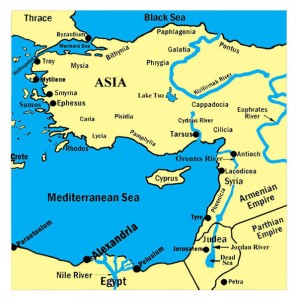Click Eastern Mediterranean for a “FREE” download of this page in PDF format.
 The grain supply from the Eastern Mediterranean was critical to Ancient Rome. Without it, the people of Italy would face famine. In the early years of the Republic, Egypt was Rome’s most important supplier of grain. In later years, Egypt continued to be one of the important provinces of the Roman Empire.
The grain supply from the Eastern Mediterranean was critical to Ancient Rome. Without it, the people of Italy would face famine. In the early years of the Republic, Egypt was Rome’s most important supplier of grain. In later years, Egypt continued to be one of the important provinces of the Roman Empire.
In the first century BC, Rome’s fiercest enemies were the Parthians. They were great desert fighters. In 53 BC, Marcus Crassus, the richest Roman of his time and a member of the first triumvirate, led an army against them. The Parthians defeated him easily and made an example of him by “beheading” him.
In Judea, in 48 BC, Herod’s father, Antipater, appointed Herod governor of Galilee and appointed his older brother, Phaesal, governor of Jerusalem. Herod was only twenty-five at the time.
In 40 BC, Antigonus the Hasmonean, supported by the Parthians, invaded and gained control of Judea. Herod’s brother, Phaesal, was captured. He committed suicide by beating his head against the prison wall. Herod fled to Rome through Egypt, meeting with Cleopatra on the way. Once in Rome, with the political support of Mark Antony and Octavian, he was nominated and elected ‘King of the Jews’ by the Roman Senate. He returned to Judea, and in 37 BC, with the backing of the Roman army, Herod took Judea back, thus ending the Hasmonean dynasty.
Later, Mark Antony led armies against the Parthians without success. He was criticized by his own generals and by Octavian for wanting to spend time with Cleopatra rather leading the war effort.
In 30 BC, after defeating Antony and Cleopatra at Actium, Octavian followed the two of them to Alexandria with his 100,000 man army. Antony’s disenhearted soldiers deserted him. Knowing all was lost, he committed suicide, dying in Cleopatra’s arms. She committed suicide shortly thereafter.
Before he headed back to Rome, Octavian declared Egypt a province of Rome and had his soldiers clean and repair the canals so that the grain would flow easily. He taxed the wealthy land owners heavily. But he told them that they would prosper under his rule because he would pay them a fair price for their grain and their other exports and that they would get paid on time. They were generally satisfied with this.
One of the most interesting statements in the historical record indicates that, in 30 BC, “the interest rates in Rome dropped from twelve to four percent” once Egypt came under Roman control.
